7 E-Commerce Quiz Examples for Inspiration in 2025
E-commerce quizzes let your brand engage your shoppers and further personalize their shopping experience.
Such interactive content offers a unique way to improve customer engagement and drive conversions.
In this article, we’ll explore seven e-commerce quiz examples you can use to inspire your online store.
TL;DR
- E-commerce quizzes are sets of interactive questions that brands show to their shoppers, which are designed to gather information to give personalized product recommendations.
- The top benefits of quizzes for online stores are that they increase customer engagement and satisfaction, leading to increased conversion rates and average basket sizes.
- Some of the best examples of e-commerce quizzes are from Rad Power Bikes, which set up a conversational experience, and Sephora’s quiz, which offers personalized skincare products.
What is an E-Commerce Quiz?
An e-commerce quiz is a set of interactive questions you show your shoppers to gather information about their product preferences and needs.
They help your brand deliver a personalized shopping experience by asking customers questions and recommending products.
Also known as product recommendation quizzes, help your brand collect first-party customer data and feed these insights into your product recommendation engine.
➡️ In a world where customers are overwhelmed with product choices, product quizzes let them narrow their choices.
By personalizing the customer experience, you will improve your online store’s conversion rates and customer satisfaction,

💡 This is similar to how an in-store shopping assistant acts.
They approach confused consumers who need to know what products to choose, ask them questions, and then recommend a product for their needs.
As online stores do not have shopping assistants, merchants have begun personalizing the shopping experience with e-commerce quizzes in a conversational experience.
These product quizzes make it easy for first-time visitors to find what they are looking for and for your brand to convert them.
What are the Benefits of Using E-Commerce Quizzes?
The main benefits of e-commerce quizzes are that they:
- Offer a personalized shopping experience where your customers receive product recommendations tailored to their needs.
- Improve customer engagement with your brand, leading to increased conversion rates.
- Increase average order value (AOV) by recommending product bundles and products that go together for best results.
When customers feel they receive personalized product recommendations, they’re more likely to purchase, making quizzes an effective tool for personalizing your store’s experience.
💡 Statistics show that personalized product recommendations can make 28% of shoppers more likely to buy a product they didn’t intend to buy initially.
E-commerce quizzes also help you gather more first-party customer data and learn more about your customers.
Instead of relying on external datasets and third-party data from Google or Meta, your brand can conduct ongoing customer research.
For example, Matt Schlicht shared a story about working with a brand that sells incense to people who want to cover up the smell of weed.
They set up a quiz and found out that their customers are all older women who don’t smoke weed but just want to get rid of the smell.
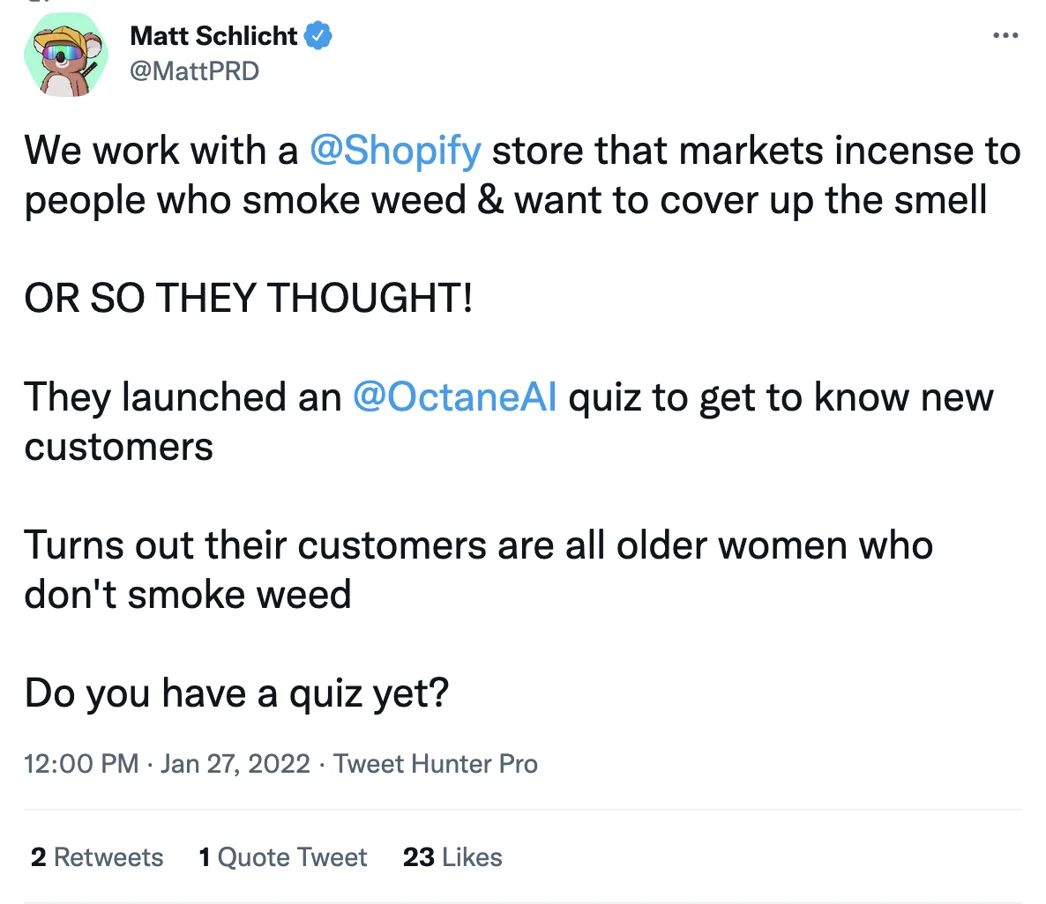
The 7 Best E-Commerce Quiz Examples To Inspire You In 2025
From beauty brands to fashion retailers, we will review 7 of the best e-commerce quizzes of online brands, improving the customer shopping experience and driving engagement.
You can use these inspirational quizzes to build your quiz strategy and delight your shoppers.
We will review why the quizzes are effective and provide insights into how these brands built them.
Example #1: Rad Power Bike’s Product Quiz
Rad Power Bikes is an online retailer that sells e-bikes.
Buying an e-bike is not easy, as shoppers must consider their personal attributes, such as height and bike features.
This is why the brand set up a conversational experience in their store to assist their shoppers in finding the right e-bike for their needs.
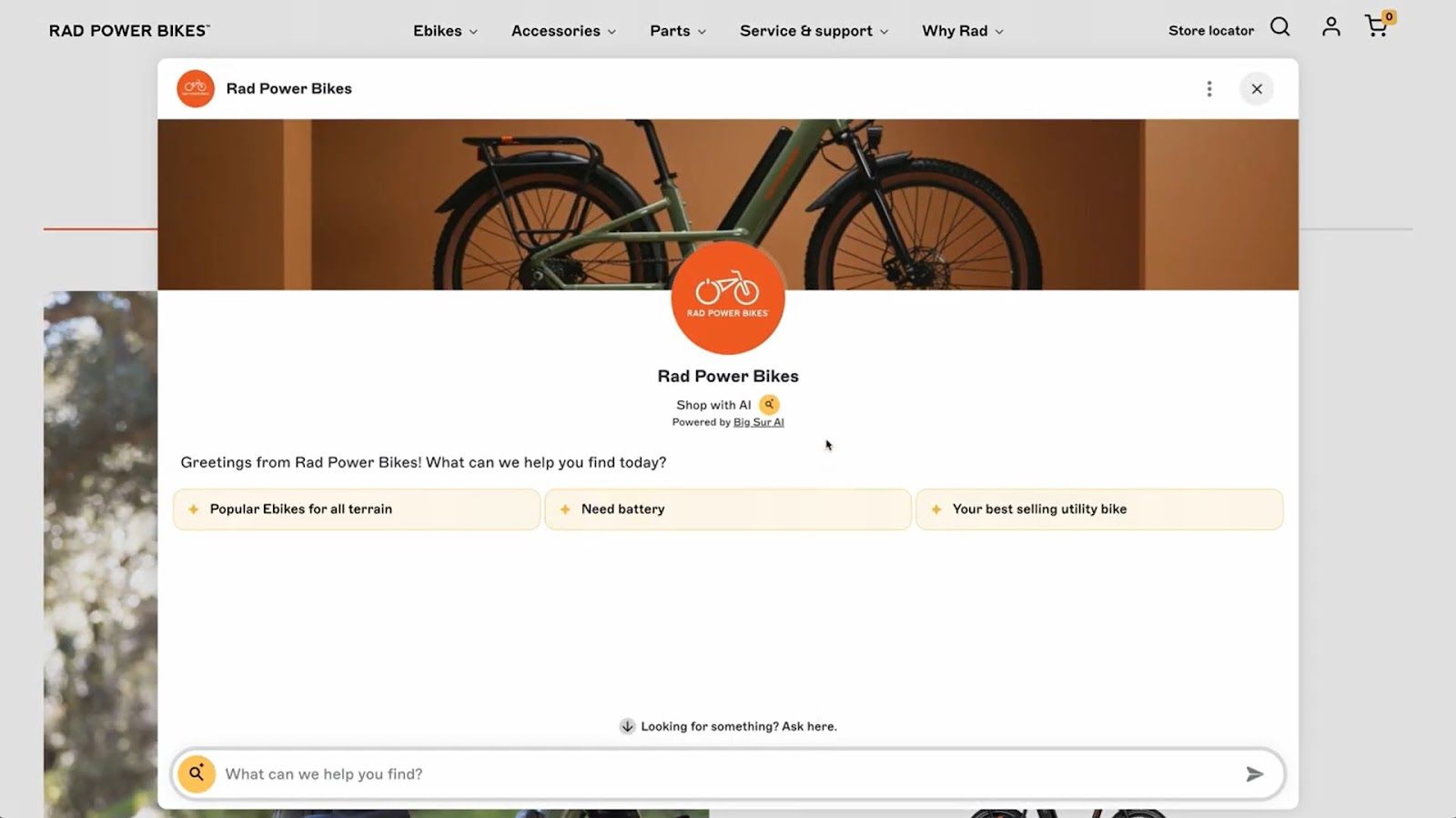
Rad Power Bikes utilized Big Sur AI’s Sales Agent (that’s us) to recreate the traditional in-store shopping experience of consumers asking a qualified assistant for advice.
The tool uses natural language processing (NLP) and generative AI to converse with their shoppers like a real human.
Here’s what the AI assistant would return as an answer if you ask it to recommend an e-bike for all terrains 👇

This is not where it ends. The conversational experience continues as the virtual assistant nudges the customers to ask for follow-ups.

Results: Rad Power Bikes sees a 12% conversion rate of customers who converse with the AI assistant.

This is a 4x increase from their average conversion rate in their store.
Here's how the AI Sales Agent works in their online store:
Example #2: Sephora’s Skincare Quiz
Sephora is an online retailer that set up an interactive e-commerce quiz to help their shoppers find the right skincare routine for their needs.

The brand uses this product recommendation quiz to offer personalized skincare routines, considering skin types, age ranges, and concerns.

After shoppers input their skincare concerns, skin type, and product preferences, Sephora’s quiz generates tailored product recommendations.
Shoppers receive these product recommendations on a category page with set-up filters.

That means the retailer has tied its quiz to its category pages.
Example #3: Dropps’ Laundry Products Quiz
Dropps is a green cleaning company that offers laundry products.
The brand set up a product quiz to help their shoppers discover the best laundry products.
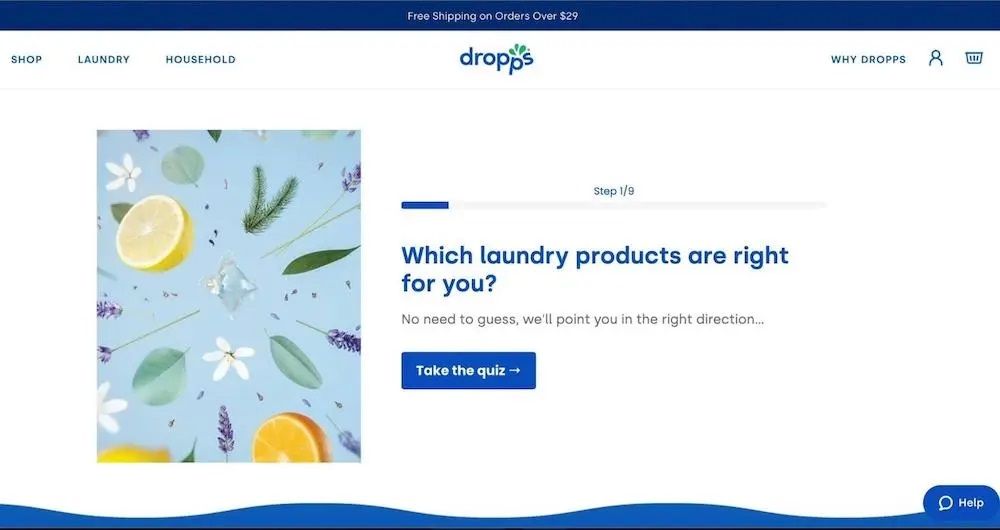
Software: Dropps partnered with ConvertFlow to build an interactive product quiz that asks multiple questions that consider:
- The customers’ lifestyles.
- The customers’ challenges when doing laundry.
- Additional questions, such as if shoppers have small kids or pets.
Before the brand gives away the results, it asks for an email address to send them to, which is a smart lead generation strategy.

The results themselves are personalized laundry product recommendations with a one-click add-to-cart CTA.
There’s also the option to set up a ‘’subscribe and save,’’ where the brand can maximize customer lifetime value with repeat purchases.
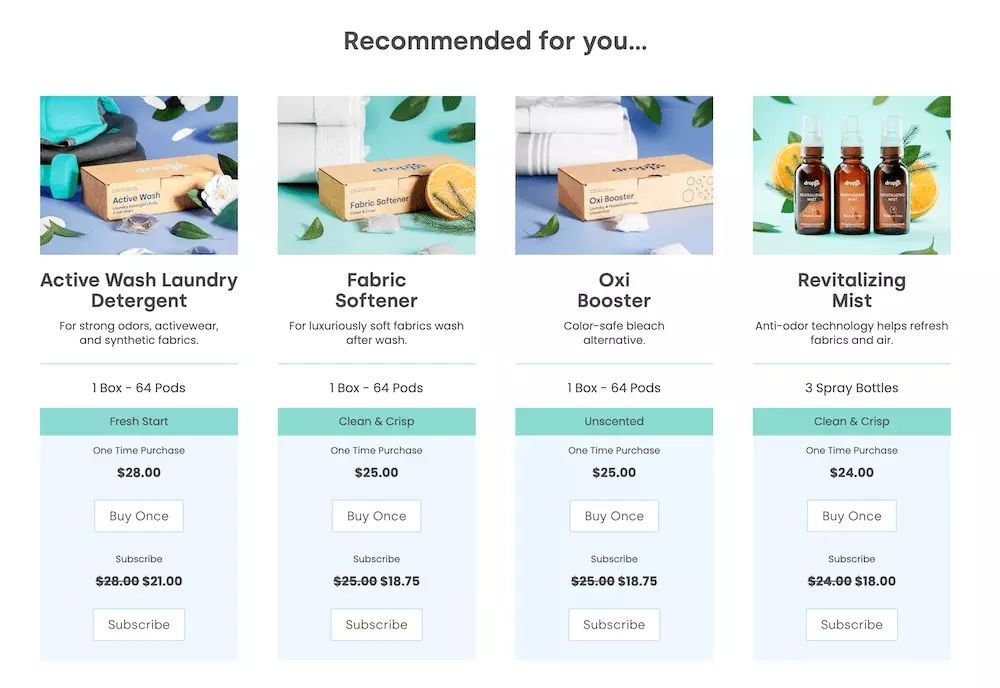
Example #4: The Hair Shop’s Pop-Up Quiz
The Hair Shop is an online retailer that has set up a quiz on their product pages to help their shoppers find the right shade for their hair.
The journey starts when customers click on ‘’What’s my color’’ on the product pages:
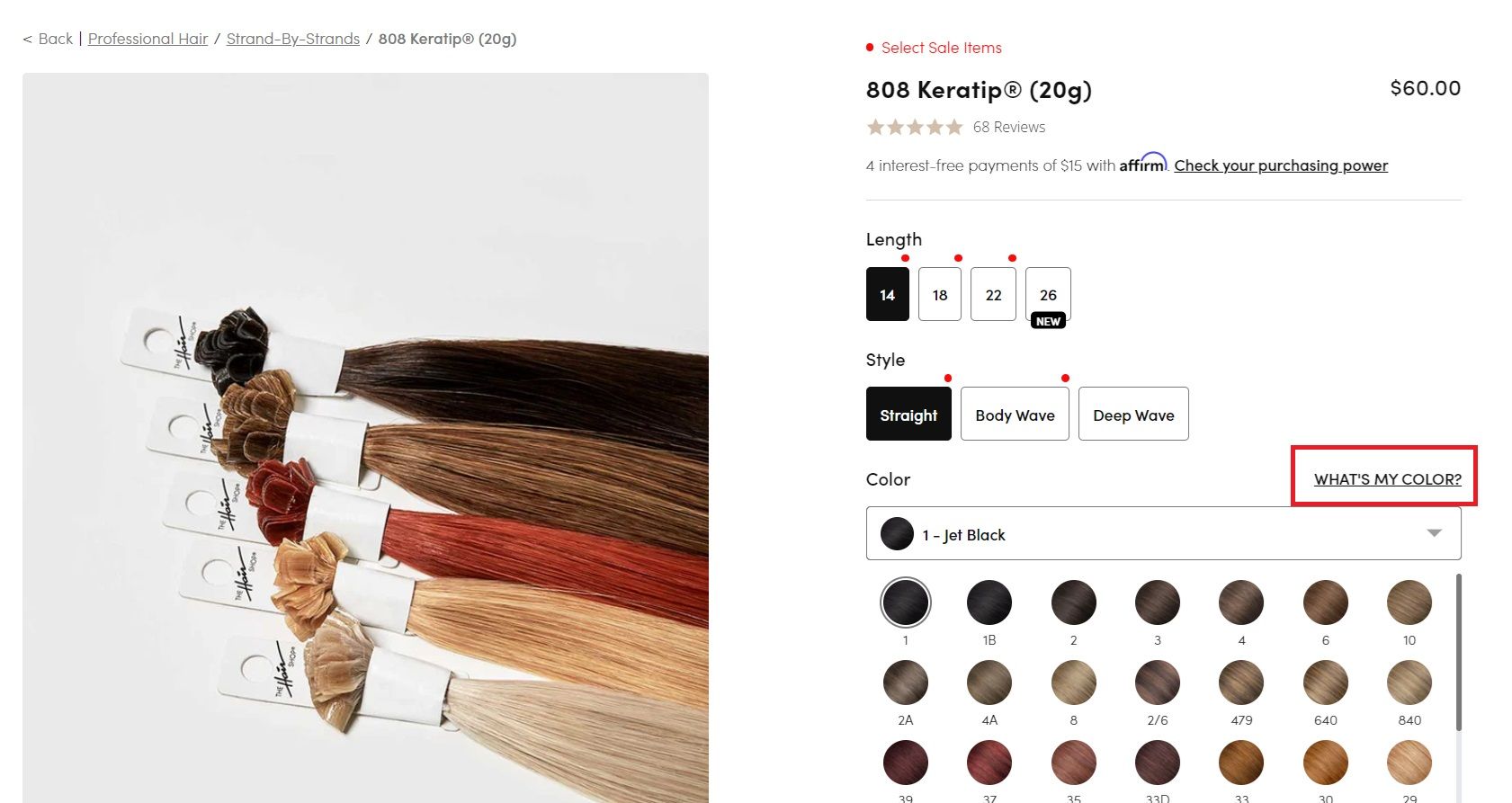
After that, a ‘’Find your shade’’ pop-up will appear, and an interactive quiz will be provided to help you find your color match.

The quiz goes over:
- What type of extensions the customers are looking for.
- The hair type.
- Age range and ethnicity.
- If the roots and ends match.
After that, the brand will ask you for your email address to send you your color match.

After customers submit their email, they are shown a color match and some product recommendations.
💡 This is an example of a brand that utilizes customer information and a unique quiz placement to improve its user experience and conversion rate.
Example #5: Chief Nutrition’s Healthy Quiz
Chief Nutrition is an Australian online retailer that sells healthy snacks.
The merchant set up a quiz to help customers find snacks that consider their diet and product preferences.

The quiz considers:
- If the shopper is following a diet.
- If there are specific areas of health they want to improve (e.g., energy or sleep).
- If they struggle with craving sweet foods or savory foods.
The brand then recommends products personalized to your dietary and product preferences.
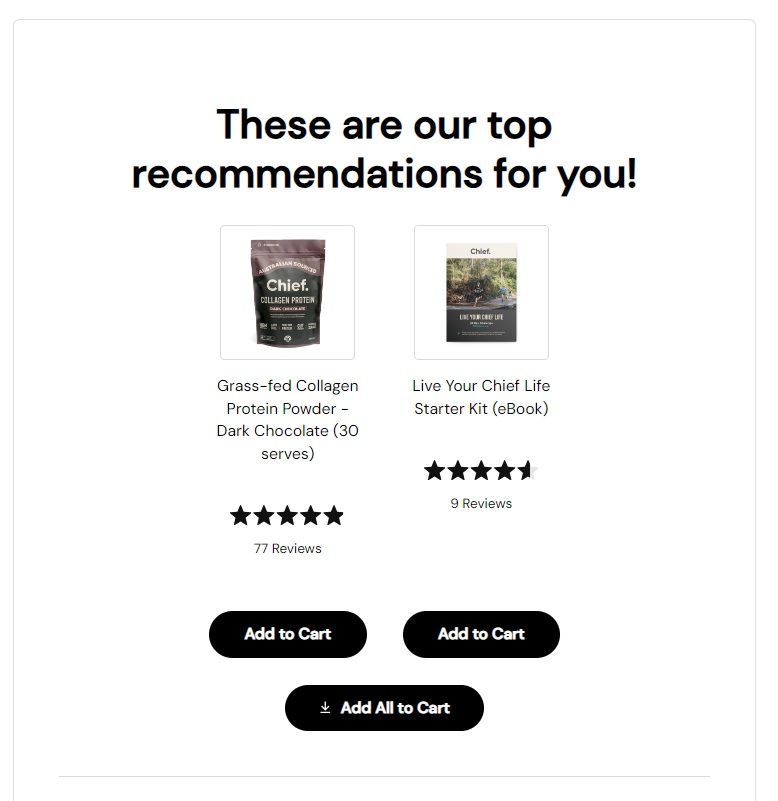
Software: To achieve such a brand-consistent quiz, Chief Nutrition partnered with Okendo.
The tool offers a seamless UI, and helped the brand to set up an easy-to-complete interactive quiz.
Example #6: Gainful’s Quiz on Supplement Products
Gainful is an e-commerce store that built a quiz to provide shoppers with personalized supplement products.
The merchant's goal was to provide recommendations tailored to each customer’s physiology, dietary restrictions, and fitness goals.

The brand is interested in knowing its customers:
- Nutrition goals, such as building muscle or losing weight.
- How experienced are the customers in supplements and nutrition in general?
- How would they describe their fitness journey? Such as just starting or having a consistent plan.
- The kind of exercises they do, such as swimming, team sports, or gym.
- Lastly, the time of the day the customers exercise and the times per week they are training.
Before the quiz is about to give customers the answers, they also consider their weight and height to make sure that the recommendations are as personalized as possible.
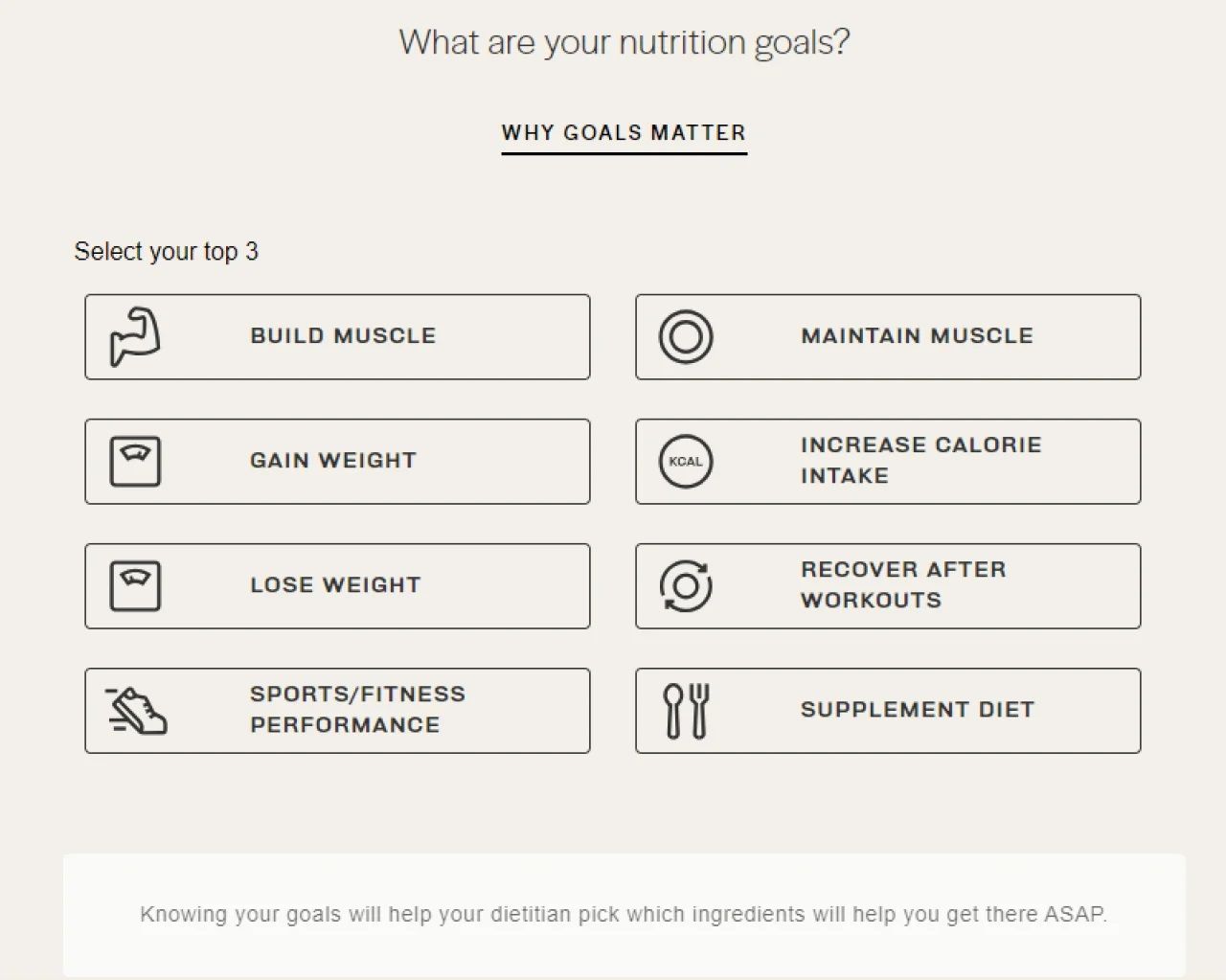
Gainful’s quiz also has a ‘’Why we ask’’ section, which enables shoppers to understand why each question was asked for personalized recommendations.
This approach to educating the shoppers why questions are asked has proven beneficial for the brand, as they are able to explain the reason behind recommendations.
Example #7: Beardbrand’s Beard Quiz
Beardbrand is a men’s grooming line that helps men simplify their beard routine by undertaking their quiz.
The brand offers a quick quiz to find out what type of beard the customers have so they can recommend beard care products.
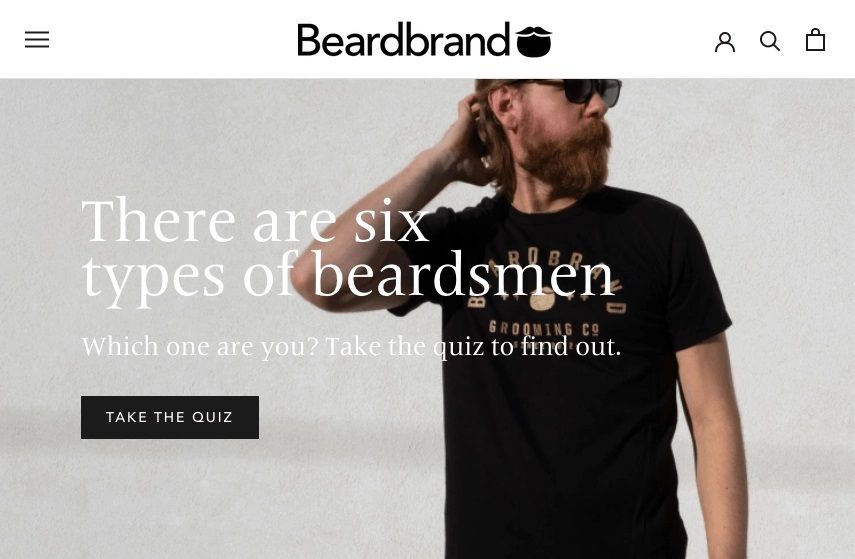
Shoppers are shown a ten-question quiz to determine their beard type, which makes them more confident in the recommendations that are about to come.

Beardbrand wants to know the following:
- Which activities are their customers doing? Such as hunting, cruising, or traveling.
- What kind of facial hair do they want? Such as a full beard or a mustache.
- What kind of hairstyle do they have? Such as a skin fade or a buzzcut.
- What kind of beard grooming products do they use already?
There are additional questions about what kind of fragrance they would prefer or what car they would prefer to drive.
Such questions may not be relevant to the product recommendations, but they are important for discovering more about the readers' personality.
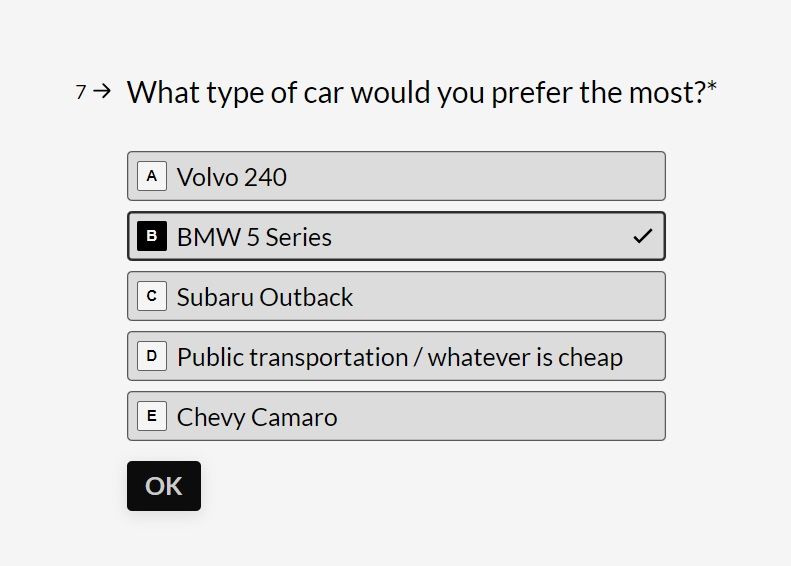
Best Practices for Creating a Product Quiz
Some of the best practices for e-commerce quizzes include:
- Creating a quiz consistent with your brand’s look and feel.
- Ask easy questions so that every customer can answer them. Do not always expect your users to have the perfect idea of what they want.
- Using software to make the process easier - a conversational experience with product recommendation software like Big Sur AI or quiz-building tools like Okendo.
- Ensuring the quiz is mobile-friendly and can load on all mobile devices.
- Asking enough questions to ensure there’s enough information to make product recommendations that will convert.
- Create a section outlining why these questions are being asked, and how they shape the overall recommendations customers receive.
- Some questions can be getting to know your customers on a more personal level, such as asking them how they spend their free time.
💡 Successful personalization can increase customer satisfaction by up to 20% and conversion rates by up to 15%.
If your brand can craft an easy-to-follow quiz that provides shoppers with tailored product recommendations, you can optimize your store’s conversion funnel.
How Else Are Merchants Personalizing The Customer Experience?
After we covered how quizzes are one of the most effective ways to personalize your customers’ shopping experience, you can read our article on the ten best personalization examples in e-commerce.
Get Started For Free With Big Sur AI
Optimize your e-commerce store with a conversational experience that works 24/7 to assist your customers.
You can now try the sales agent for free on your store with an instant installation.
The tool acts as a quiz as it asks your customers follow-up questions, helping them find the ideal product(s) for their needs.
You will also get analytics into the conversion rates of each question your customers ask that leads to a conversion.
This will help your marketing team identify the crucial pre-purchase questions interested customers ask.
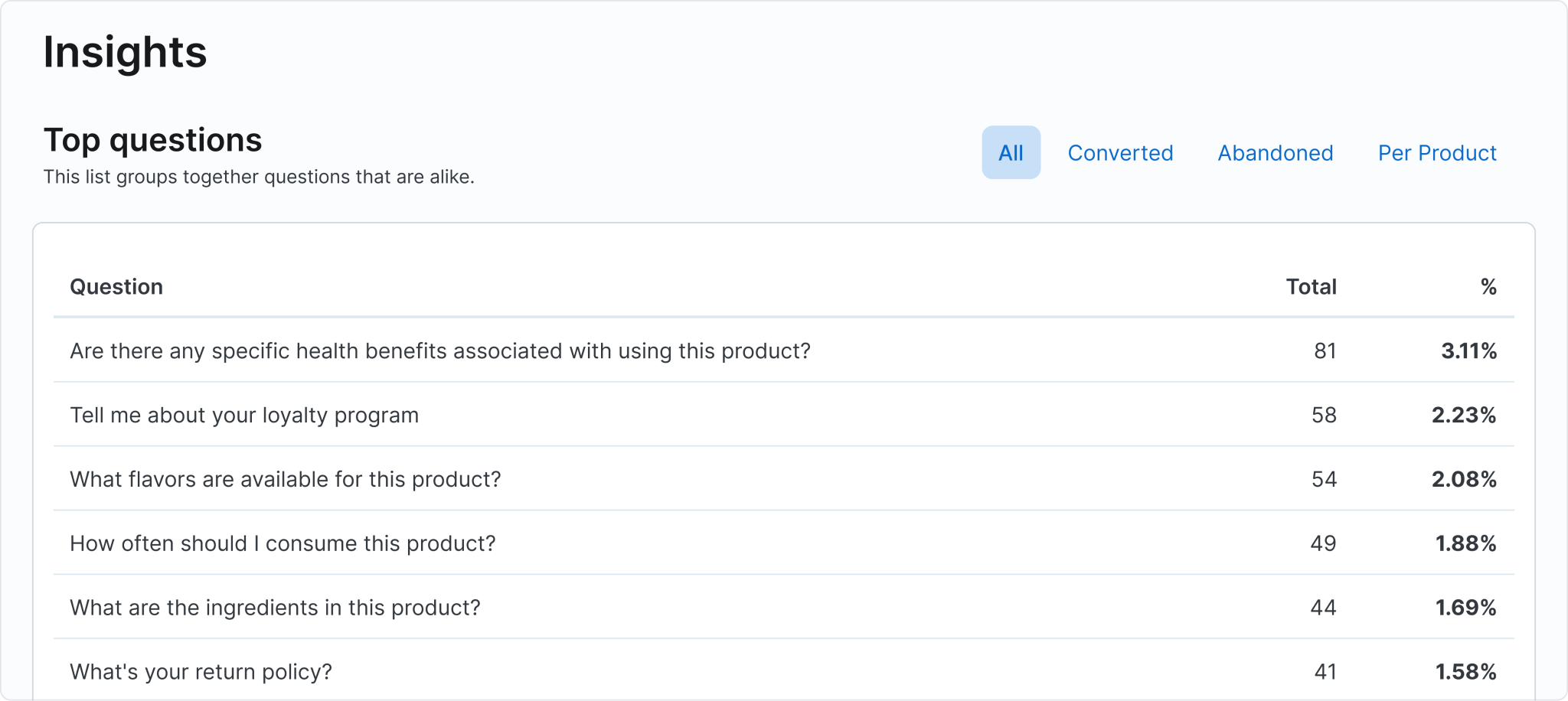
Your brand will also gain insights into what products are frequently bought together, which can help you improve your store’s shopping experience.

Use the insights to improve your site’s experience, including merchandising and product descriptions, to build a marketing strategy based on what customers truly want.
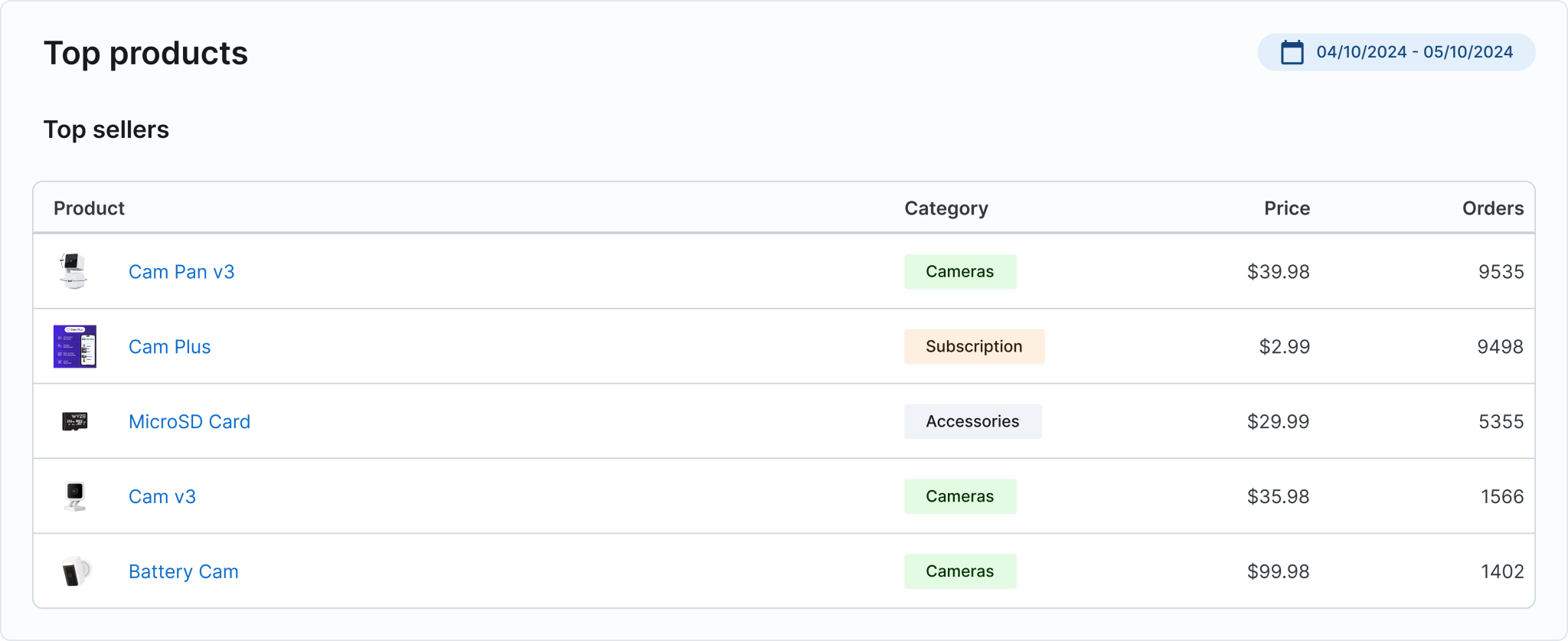
Lastly, you can see where shoppers churn and where the AI Sales Agent helped drive spikes in both sales volume and conversion rate:

Our AI-powered Sales Agent can guide your customers' shopping journey with personalized recommendations and conversion-optimized prompts.


